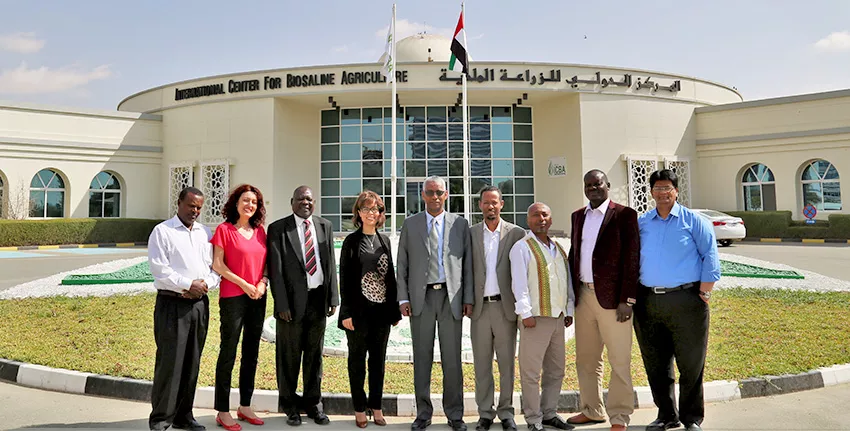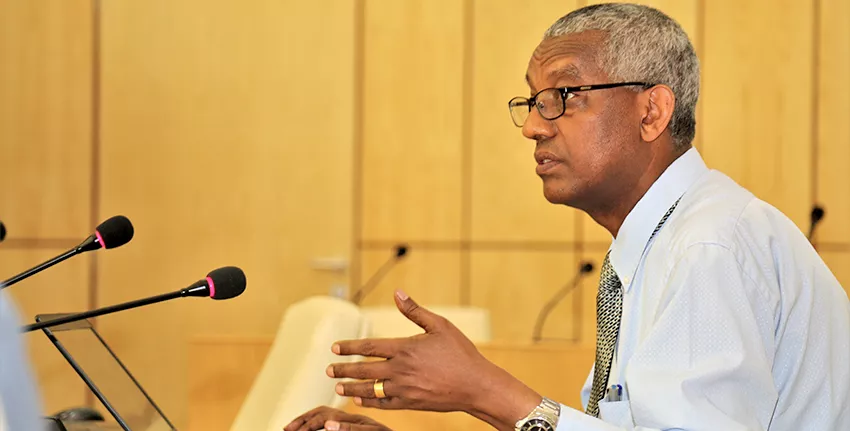Dealing with soil salinity through alternative crops in Ethiopia, South Sudan
27 February 2018
The International Center for Biosaline Agriculture (ICBA) is introducing alternative salt-tolerant crops in Ethiopia and South Sudan to help smallholder farmers cope with soil salinity.
This work forms a major part of an International Fund for Agricultural Development (IFAD)-funded project under the title of “Rehabilitation and management of salt-affected sols to improve agricultural productivity (RAMSAP)”.
Soil salinization is one of the major causes of declining farm and livestock productivity as well as natural biodiversity in Ethiopia and South Sudan. With 11m ha of land affected by salinity, Ethiopia ranks top of the list of African countries in terms of the size of salt-affected territory. Both human activities and natural processes are factors.
As Ethiopia and South Sudan have large numbers of livestock, there is an urgent need to improve forage production through cultivation of plants resistant to biotic (pests and diseases) and abiotic stresses such as drought and salinity. This is the goal of the RAMSAP project led by Dr. Asad Sarwar Qureshi, a senior scientist in water and irrigation management at ICBA. The project aims to ensure higher agricultural productivity, food security and income for smallholder farmers by promoting appropriate technologies and practices for rehabilitation and sustainable management of irrigated salt-affected farming systems.
As part of the project, high-level delegations from Ethiopia and South Sudan led by H.E. Dr. Kaba Urgessa, State Minister for Agriculture and Natural Resources, and Dr. Victor Bennet, Director General of Research at the Ministry of Agriculture, Forestry, Cooperatives and Rural Development, respectively visited the ICBA’s head office in Dubai on 26-27 February 2018 to attend the annual progress meeting.
During the meeting, project partners held detailed discussions on the results of different studies being carried out under RAMSAP in both countries. In particular the discussions focused on scaling up tested technological packages outside the project target areas during the next two years.
The delegations also met Dr. Ismahane Elouafi, Director General of ICBA, who briefed them about the center’s major research-for-development programs on crop productivity and diversification, climate change impacts and management, policy analysis, aquaculture and bioenergy, and natural resources management in different regions like the Middle East, North Africa, Central Asia and the Caucasus.
On the sidelines of the two-day meeting, an AgTalk (an ICBA-organized series of talks by high-level speakers) was given by Dr. Kaba Urgessa on the Ethiopian Agriculture and Future Plans and by Dr. Victor Bennet on the Comprehensive Agricultural Development Plan for South Sudan.
During the AgTalk event, Dr. Kaba Urgessa said: “With ICBA, we have launched the rehabilitation of salt-affected soils, and at the end of the Growth and Transformation Plan (GTP) II, 128,000 ha of saline soil will be rehabilitated and reclaimed using alternative agricultural technologies. By now varieties from our country and those provided by ICBA are being adopted in four regions such as Oromia, Amhara, Afar, and Tigray.”
He also said: “Over the last two years, we have been trying to introduce the salt-tolerant varieties developed by ICBA as well as the local ones that we have tested at different sites of our agricultural research institute. We are also trying to involve local universities, especially those situated in the salt-affected regions. So far, interim results indicate that there are some species which are very good at withstanding saline soil conditions, and some of the species can be edible and some could be used as feed for cattle. In these areas, over 5 percent of our arable land is affected by medium to high levels of salinity. I think through the work we are doing with ICBA, as well as the scientific and technical support we are getting from this organization, we will come up with the best solutions for food and feed.”
Highlighting the importance of ICBA’s work in South Sudan, Dr. Victor Bennet said: “I am very glad to have visited ICBA, which is very impressive and supportive of South Sudan. We have been doing research in collaboration with ICBA, and now during this visit, I wanted to see what technologies they are applying especially in the field of salinity and salt-affected areas. What we have been doing this year is mostly surveying and collecting samples. But we came here to review the project itself and see the challenges which we have faced so far, and discuss the way forward. One way forward is, as we tested the varieties from ICBA and results were very encouraging, to upscale them and do a participatory selection with farmers in the selected areas. So far we have selected five areas in South Sudan and now at ICBA, we are discussing expansion of areas and upscaling of varieties.”












